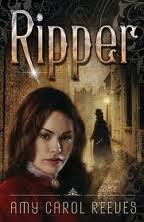Title: The Ripper
Author: Amy Carol Reeves
Publisher: Flux Books
Pub Date: April 08, 2012
ISBN: 9780738730721
Publisher: Flux Books
Pub Date: April 08, 2012
ISBN: 9780738730721
WARNING: The following is a review of half of the novel, because I did not finish it. If the concept of reviewing a novel one hasn’t finished infuriates you or violates your reading and reviewing code of ethics, you may wish to stop reading here. On the other hand, this could be the perfect hate read for you. I enjoy hate reading (mostly blogs) on a daily basis, so if I can provide that outlet for someone, I’m delighted.
On to the review.
I wanted to like this novel. I really, really did. It has a number of elements that appeal to me—a mystery involving a horrific killer, a Victorian setting, a heroine rebelling against the conventions of her repressive society, and an examination of a historical issue (the health care available to poor pregnant women).
But despite all these elements, the book simply did not succeed in entertaining or holding my interest. Part of the problem was that in utilizing the various elements of plot and setting that I described above which have become familiar through hundreds of novels, The RIPPER feels too familiar. It feels like something I’ve read before, only executed less successfully.
Abbie Sharp, who has recently moved to London to live with her prim and proper grandmother following the death of her mother, is spunky and unconventional. Yet the elements of the character that are meant to be unique—the fact that she wants to pursue a career in medicine, for example—are presented without any context or set up. One day, Abbie tells another character she wants to be a doctor, after a number of days volunteering at the hospital. Yet we get no glimpse of her interior process regarding this dream. How long has she wanted to be a doctor? What prompted this dream, besides being around doctors? The reader isn’t told.
Perhaps if I had been more interested in the protagonist, I would have overlooked these faults. But while Abbie has the potential to be appealing, she feels too generic to capture the reader’s attention. Additionally, the number of anachronisms and scenes which felt untrue or unrealistic to the setting pulled me out of my state of suspended disbelief too many times.
There are some scenes which show promise. These more cohesive portions are almost entirely set in the hospital where Abbie is implausibly volunteered by her grandmother, as punishment for her immodest behavior in chasing a thief. It’s unclear how or why working in a charity hospital amongst the downtrodden is supposed to teach Abbie not to behave like a member of the “lower classes.” This volunteer work is supposed to be a week but somehow morphs into an indefinite period.
Despite the unconvincing premise of Abbie’s presence in the hospital, the scenes set there felt true. The suffering of the women in labor, the difficulty of caring for the newborns whose mothers have died, and the overall lack of resources of the Whitechapel Hospital made for the most engaging and persuasive scenes in the novel.
I put down and returned to the novel several times, hoping to find it more interesting. Unfortunately, it didn’t work for me. When you raise your own expectations regarding a novel because it has so many elements that are right up your alley, the letdown is that much greater. Because she created a novel with all of said elements, I would certainly be willing to try to read Reeves’ further work, but I can’t recommend THE RIPPER.

One of my pet peeves when reading a historical book is when the characters step out of their place in time. It just ruins the whole feel of the world that's been created...
ReplyDeleteYeah, it drives me crazy. I start to question the author's decision to set the story in that time period.
ReplyDelete